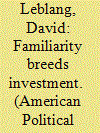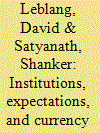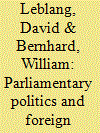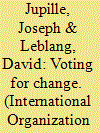|
|
|
Sort Order |
|
|
|
Items / Page
|
|
|
|
|
|
|
| Srl | Item |
| 1 |
ID:
141858


|
|
|
|
|
| Summary/Abstract |
This article analyzes the determinants of international child adoption. We argue that prospective parents' desire to reduce transaction costs and ensure a successfully completed adoption influences adoption flows. Drawing on dyadic panel data over the period 1991–2010, we fit hurdle models to identify sending-country and dyad characteristics that correlate with adoption flows. We show that an international agreement designed to ensure the integrity of adoption depresses foreign adoptions by raising transaction costs. By contrast, adoption is more likely when sending countries have a high-quality regulatory environment and when colonial or migration ties exist within the dyad. Our findings highlight the impact of transaction costs on transnational, non-market exchange, expand political economy models of migration, and emphasize the importance of private international law in international relations.
|
|
|
|
|
|
|
|
|
|
|
|
|
|
|
|
| 2 |
ID:
132506


|
|
|
|
|
| Publication |
2014.
|
| Summary/Abstract |
Bilateral flows of international migrants exhibit tremendous variance both across destination countries and over time. To explain this variance, studies of international migration tend to focus on economic determinants such as income differentials or on social conditions such as the presence of coethnics in certain destination countries. The authors argue that migration is driven not solely by economic or social determinants; rather, the political environment across destinations plays a substantively large role in influencing bilateral migration flows. They test the importance of the political environment-citizenship rights and the prominence of right-wing parties-using data on migration flows from 178 origin countries into 18 destination countries over the period 1980-2006. They find, even after controlling for a variety of economic, social, policy, and international variables, that variation in political environments across time and destination plays a key role in observed patterns of international migration
|
|
|
|
|
|
|
|
|
|
|
|
|
|
|
|
| 3 |
ID:
100772


|
|
|
|
|
| Publication |
2010.
|
| Summary/Abstract |
What explains cross-national patterns of international portfolio and foreign direct investment (FDI)? While existing explanations focus on the credibility of a policy maker's commitment, we emphasize the role of diaspora networks. We hypothesize that diaspora networks-connections between migrants residing in investing countries and their home country-influence global investment by reducing transaction and information costs. This hypothesis is tested using dyadic cross-sectional data for both portfolio and FDI. The findings indicate that even after controlling for a multitude of factors, disapora networks have both a substantively significant effect and a statistically significant effect on cross-border investment.
|
|
|
|
|
|
|
|
|
|
|
|
|
|
|
|
| 4 |
ID:
133279


|
|
|
|
|
| Publication |
2014.
|
| Summary/Abstract |
We undertake an individual-level analysis of mass political behavior toward sovereign debt resettlement by leveraging the unique circumstances of a 2011 referendum on debt repayment in Iceland. This allows us to engage broader questions about mass international political economy. Against the recent thrust of a growing literature, we find evidence of material economic "pocketbook" effects-self-interest-on voting behavior, operating alongside symbolic/sociotropic and partisan/political logics. Contrary to expectations, these self-interest effects are not conditional on voter sophistication. We conclude that conventional sampling frames may be inappropriate for understanding contemporary democratic contestation over international economic policy.
|
|
|
|
|
|
|
|
|
|
|
|
|
|
|
|
| 5 |
ID:
070106


|
|
|
| 6 |
ID:
139533


|
|
|
|
|
| Summary/Abstract |
Does language choice attract foreign direct investment (FDI), and if so, how? We argue that language—a dynamic instrument for reducing transaction costs—can influence investors' decision to allocate capital. Potential host countries attract investments by coordinating their domestic language policies—especially those in education—to match the language of the potential FDI investor. We subject our argument to three different tests: (i) a cross-sectional sample of all global Organization for Economic Co-operation and Development investments that employs a newly constructed language-in-education measurement; (ii) a newly assembled time-series cross-sectional data set of all Chinese FDI abroad; and (iii) a detailed case study that uses process tracing to explain Chinese FDI in Indonesia. The results from these tests demonstrate a significant and robust relationship between language and FDI.
|
|
|
|
|
|
|
|
|
|
|
|
|
|
|
|
| 7 |
ID:
140352


|
|
|
|
|
| Summary/Abstract |
When it comes to linkages between migration and the global allocation of foreign development assistance, the size of the immigrant population from a recipient country residing in a donor country is an important determinant of dyadic aid commitments. Two complementary hypotheses probe this relationship. First, donors use foreign aid to achieve their broader immigration goals, targeting migrant-sending areas to increase development and decrease the demand for entry into the donor country. Second, migrants already residing in the donor country mobilize to lobby for additional aid for their homeland. Empirical tests on a large sample of country pairs made up of twenty-two donors and more than 150 recipients over the period 1993 to 2008 show robust support for these hypotheses.
|
|
|
|
|
|
|
|
|
|
|
|
|
|
|
|
| 8 |
ID:
068974


|
|
|
| 9 |
ID:
080048


|
|
|
|
|
| Publication |
2007.
|
| Summary/Abstract |
Referendum votes on adoption of the euro in Denmark (2000) and Sweden (2003) provide unprecedented natural experiments through which to study the political economy of money. Using exit polling data and multinomial logit statistical models that allow us to separate preferences for the euro from preferences for the European Union (EU), we test economic "calculation" and political "community" as determinants of individual-level preferences over adoption of the euro. We find that "calculation" operates most clearly where, as in Sweden, the choice of a fixed versus a floating exchange rate regime is at stake, while "community" exerts strong effects across the two cases
|
|
|
|
|
|
|
|
|
|
|
|
|
|
|
|
|
|
|
|
|